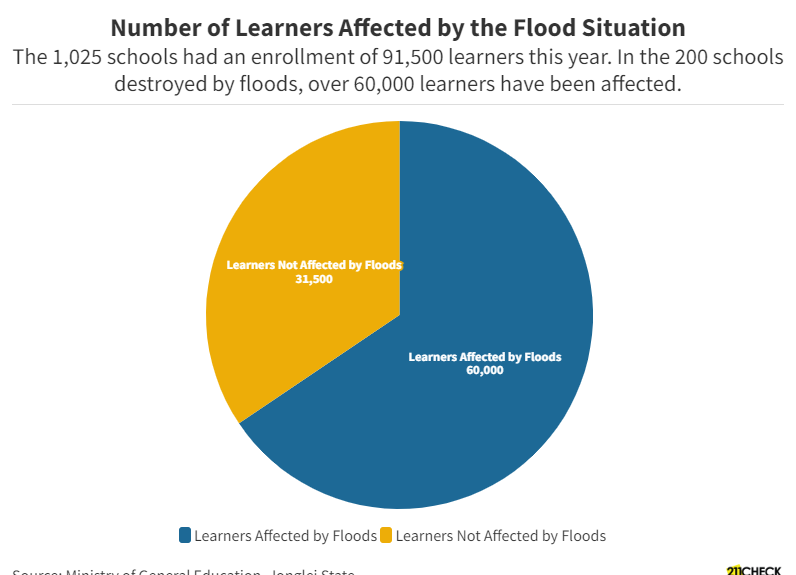Data Story: Floods destroy 200 schools in Jonglei State, over 60,000 school-going children affected
Jonglei State has 1,025 schools with an enrollment of 91,500 learners this year. In the 200 schools destroyed by floods, over 60,000 learners have been affected.
By Deng Ghai Deng
Authorities in South Sudan’s Jonglei state say more than 200 schools are submerged in flood waters and this is hampering education in the State. Francis Mayen, the director of School in Jonglei state ministry of education many students and pupils did not return to the school when school reopens in May.
Jonglei State has 1,025 schools with an enrollment of 91,500 learners this year. In the 200 schools destroyed by floods, over 60,000 learners have been affected.
“The problem of flooding which started in 2020 has greatly impacted education in Jonglei state. Most schools in the 9 counties are not operational, they are either shut down because the students left the area or the premises are completely under water.” Mayen said
Mayen says 70 percent of the students who failed to return to schools are female. He says challenges of school fees, lack of sanitary pads, earlier marriage and economic hindrance could have contributed to the dropout because floods destroyed the majority of the people’s livelihood.
“When crises such as the floods struck many people in South Sudan ignore education and some people opt to marry their daughters off. Economic crisis is also another problem. So when you look at the number of students who are now back at school you see more female students are missing.” Mayen added.
In September, the education cluster led by UNICEF and the state government initiated the mapping exercise to determine the effect of flooding on learning activities in Jonglei. The mapping – which covered accessible schools in ten locations – shows that learning and school structures have been severely affected there.
Duku Francis, UNICEF’s education specialist in Jonglei, told reporters that the UN agency was working with the state authorities to support schools.
“We will map out these schools that have been displaced or flooded, and when a school is able to identify a new land, we will provide some basic support to this school,” Francis said
Recently, the UN Office for the Coordination of Humanitarian Affairs said Close to 800,000 people have been affected by rising waters across the country since May, in particular in Jonglei, Unity, and Upper Nile states. The agency stated that Jonglei and Unity were the most affected states accounting for 58 percent of people affected by floods in the country. Early seasonal rains have caused rivers to overflow resulting in flooding in large areas and settlements
Last month the children said the weakened health system compounded by multiple shocks, including COVID-19, has also impacted the health and wellbeing of millions – with more children already needing treatment for acute malnutrition in 2021. Furthermore, an estimated 2.8 million children (51% girls) are out of school in 2021, in addition to 98,500 school-aged refugee children, of which 18,000 children are out of school. “These children need immediate child protection services from multiple risks including recruitment by armed groups, psychosocial stress, family separation, violence, abuse and exploitation in 61 most affected counties,” said Rama Hansraj, Country Director – Save the Children.
About the Authors:
Deng Ghai Deng, a Data Speaks Fellow at #defyhatenow South Sudan, wrote this data story, which was edited by 211 Check Editor Emmanuel Bida Thomas and approved for publication by Steve Topua, Data Analyst and Trainer. It’s part of the ongoing #defyhatenow South Sudan Data Speaks Fellowship program with funding from the European Union Delegation to South Sudan.
About South Sudan Data Speaks Fellowship:
This is a two-month and half data journalism fellowship for South Sudanese content creators with an aim of educating participants on the fundamentals of data journalism through in-depth training facilitated by experienced data analysts.
The fellows have been selected from across South Sudan and they are trained in data sourcing/mining, data analysis, and data visualization for two months and half (October to Mid December)
Each fellow will produce a minimum of three (03) data stories during the fellowship. The focus will be on increasing access to information.




Leave a Reply
Want to join the discussion?Feel free to contribute!